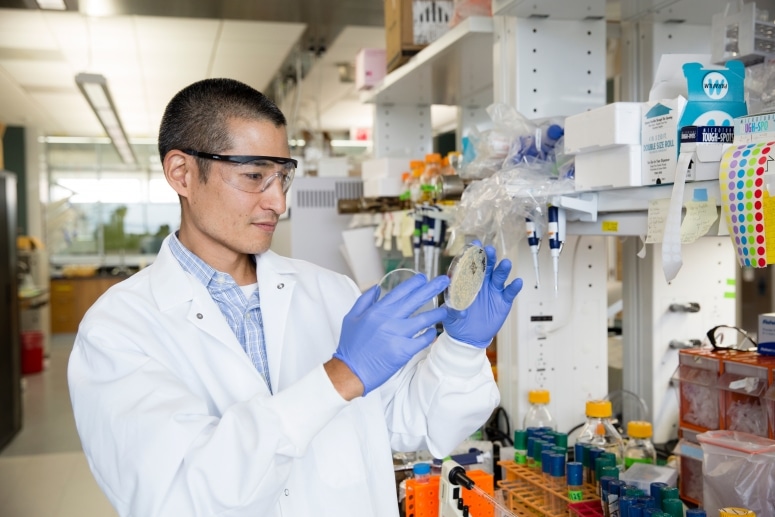Oct 17 2016
 Great Lakes Bioenergy Research Center researcher Trey Sato monitors yeast cultures in the lab. Sato and UW–Madison colleagues have engineered yeast to feast on a previously unpalatable sugar, potentially improving the microorganism’s ability to convert sugars to useful biofuels. (Credit: JAMES RUNDE/WISCONSIN ENERGY INSTITUTE)
Great Lakes Bioenergy Research Center researcher Trey Sato monitors yeast cultures in the lab. Sato and UW–Madison colleagues have engineered yeast to feast on a previously unpalatable sugar, potentially improving the microorganism’s ability to convert sugars to useful biofuels. (Credit: JAMES RUNDE/WISCONSIN ENERGY INSTITUTE)
A new method of nearly doubling the efficiency of common yeast strain to convert plant sugars into biofuel has been discovered by researchers at the University of Wisconsin–Madison and the Great Lakes Bioenergy Research Center (GLBRC). This engineered “super yeast” could improve the economics of making specialty biofuels, biproducts and ethanol.
Saccharomyces cerevisiae has been the preferred yeast of brewers and bakers for centuries. But this yeast poses a unique challenge to researchers who use it to mate biofuel from cellulosic biomass such as woods, grasses, or the nonfood parts of plants. Though the popular microbe can efficiently convert plant sugar into biofuel, it is a picky eater. It does not consume a plant’s xylose, which is a five-carbon sugar that constitutes almost 50% of all plant sugars.
For cellulosic biofuels to become economically feasible, microbes need to be able to convert all of a plant’s sugars, including xylose, into fuel.
Trey Sato, Associate Scientist, University of Wisconsin-Madison
Sato is the the GLBRC study’s lead researcher.
A paper detailing the study was published in the journal PLOS Genetics on 14 October, 2016. The isolation of certain genetic mutations that enables S. cerevisiae to turn xylose into ethanol, a discovery that can change xylose from a waste product into a fuel source, has been described by Sato and GLBRC researchers.
Sato and team provided the yeast a choice similar to eating carrots or going without food and surrounded the yeast with xylose until it either changed its distaste for the plant sugar or died. After 10 months and numerous generations of “directed evolution,” Sato and team, including UW–Madison professor of biochemistry, Robert Landick, and UW– Madison professor of genetics, Audrey Gasch developed a strain of S. cerevisiae that was capable of fermenting xylose.
The researchers named the super yeast GLBRCY128. They then wished to understand how the evolution took place, to duplicate the yeast. Y128’s genome was compared to the initial strain by Gasch, who combed through nearly 5,200 genes of both the original and Y128 strain to discover four gene mutations that caused the adapted behavior. The researchers manually removed these mutations from the original strain to verify the discovery. This produced the same findings.
Sato states that the discovery could facilitate a broad range of biofuels research in the future. With the publication of the process of producing Y128, researchers can produce it themselves for the sake of applying it to different plant materials and new biomass pretreatment methods. “Scientists won’t need to adapt their research to the process that we’re doing here,” he says. “They can just take our technology and make their own strain.”
Upcoming research can also focus on the potentially significant role of the super yeast in producing bioproducts and specialty biofuels.
We want to take this strain and make higher-order molecules that can be further converted into jet fuels or something like isobutanol, lipids or diesel fuel, and if we know how to better metabolize carbon, including xylose, anybody in theory should be able to rewire or change metabolic pathways to produce a variety of biofuel products.
Trey Sato, Associate Scientist, University of Wisconsin-Madison